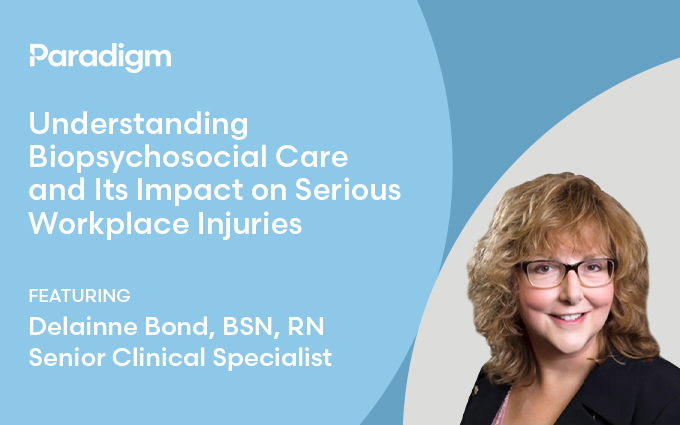07/09/2021

Psychosocial care emphasizes the importance of a patient’s emotional and psychological well-being during recovery. Biopsychosocial care adds an important layer to this concept: biology. With an interdisciplinary approach that recognizes biological and neurological aspects of mental health, biopsychosocial care models address these key patient needs for improved behavioral health support.
When helping patients with the most highly complex needs in workers’ compensation, the Paradigm Systematic Care ManagementSM model relies heavily on biopsychosocial methods. Injured workers recovering from injuries—including brain and spinal cord injuries, burns, and limb loss—face major, though not always conspicuous, physical, cognitive, and/or emotional barriers in returning to normal activity and function. These injuries can have a devastating effect on the psychological health of the worker and the people around them.
Biopsychosocial treatment models recognize the real impact of trauma on the brain
Integrating treatment methods built on the biopsychosocial model into the care plans for these injured workers helps to address their mental and social health. This is based on a deep clinical understanding of the mind-body connection, and the complex interplay between thoughts, feelings, behavior, and function. Recovering from serious injuries involves healing not only the body, but healing the mind and empowering the spirit as well. “When there is serious trauma, you cannot separate the bio from the psychosocial because of the effect the trauma has on brain and bodily function,” says Delainne Bond, BSN, RN, Senior Clinical Specialist for Paradigm.
“For any major injury,” explains Bond, “the ‘fight or flight’ response and other physical reactions disrupt normal brain functioning in several ways. For example, oxygen is diverted from your brain and hormones, such as adrenaline, are released. This affects the way the brain responds, and can actually alter neural pathways.” She likens it to having to take a detour when a bridge is closed. “In the same way that it takes more time to find an alternate route in your car, it’s going to take time for the brain to reroute and find a detour around the trauma and find a ‘new normal.’”
Effective whole-person methods for a return to family, community, and work
According to Bond, some patients are less able to build these new pathways in the brain, essentially becoming stuck in the trauma. This can be due to a range of factors, including the degree of family support, preexisting mental health issues, and the severity of the injury itself. In these situations, behavioral health support derived from biopsychosocial care models plays a critical role in improving functional recovery, in both physician and mental realms.
Bond emphasizes the importance of identifying providers that use evidence-based therapies in behavioral health for workers’ compensation claimants. “One promising technique is Eye Movement Desensitization and Reprocessing, or EMDR. This technique has been shown to be effective in alleviating post-traumatic stress symptoms. It involves having patients recall the traumatic event while simultaneously performing bilateral stimulation (i.e., eye movements) exercises, which helps to ‘reprocess’ the traumatic experience and lessen the emotional impact.” She says that there is no one-size-fits-all approach to biopsychosocial care, however, and stresses the importance of identifying and assessing patients as early as possible in the care process. “Ideally, we would want to get the highest-risk patients into behavioral therapy before or at the time they start their physical therapy.”
Paradigm’s comprehensive biopsychosocial approach to care is built on dedicated behavioral health support right at the outset of care management. From dedicated training to identify barriers to recovery, to dedicated behavioral health specialists that form part of Paradigm’s Management Team, to partnerships with behavioral health provider networks that help injured workers access needed resources, Paradigm is committed to holistic biological, psychological, and social support. Says Bond, “We’ve seen time and again that committing to a patient’s whole health gets them back to healthy, productive activity sooner and with long-term cost savings.”
Learn about Paradigm’s commitment to whole-person care and behavioral health support.